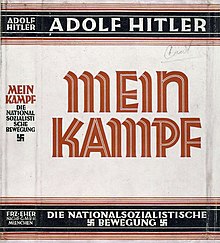Mein Kampf

Dust jacket of 1926–1928 edition
|
|
| Author | Adolf Hitler |
|---|---|
| Country | Germany |
| Language | German |
| Subject | Autobiography |
| Publisher | Eher Verlag |
|
Publication date
|
18 July 1925 |
|
Published in English
|
13 October 1933 (abridged) 1939 (full) |
| Media type | Print (Hardcover and Paperback) |
| Pages | 720 |
| ISBN | |
| Followed by | Zweites Buch |
Mein Kampf (German: [maɪ̯n kampf], My Struggle) is a 1925 autobiographical book by Nazi Party leader Adolf Hitler. The work outlines Hitler's political ideology and future plans for Germany. Volume 1 of Mein Kampf was published in 1925 and Volume 2 in 1926. The book was edited by Hitler's deputy Rudolf Hess.
Hitler began the book while imprisoned for what he considered to be "political crimes" following his failed Putsch in Munich in November 1923. Although Hitler received many visitors initially, he soon devoted himself entirely to the book. As he continued, Hitler realized that it would have to be a two-volume work, with the first volume scheduled for release in early 1925. The governor of Landsberg noted at the time that "he [Hitler] hopes the book will run into many editions, thus enabling him to fulfill his financial obligations and to defray the expenses incurred at the time of his trial." In 2016, following the expiry of the copyright held by the Bavarian state government, Mein Kampf was republished in Germany for the first time since 1945.
Hitler originally wanted to call his forthcoming book Viereinhalb Jahre (des Kampfes) gegen Lüge, Dummheit und Feigheit, or Four and a Half Years (of Struggle) Against Lies, Stupidity and Cowardice. Max Amann, head of the Franz Eher Verlag and Hitler's publisher, is said to have suggested the much shorter "Mein Kampf" or "My Struggle".
The arrangement of chapters is as follows:
In Mein Kampf, Hitler used the main thesis of "the Jewish peril", which posits a Jewish conspiracy to gain world leadership. The narrative describes the process by which he became increasingly antisemitic and militaristic, especially during his years in Vienna. He speaks of not having met a Jew until he arrived in Vienna, and that at first his attitude was liberal and tolerant. When he first encountered the anti-semitic press, he says, he dismissed it as unworthy of serious consideration. Later he accepted the same anti-semitic views, which became crucial in his program of national reconstruction of Germany.
...
Wikipedia
